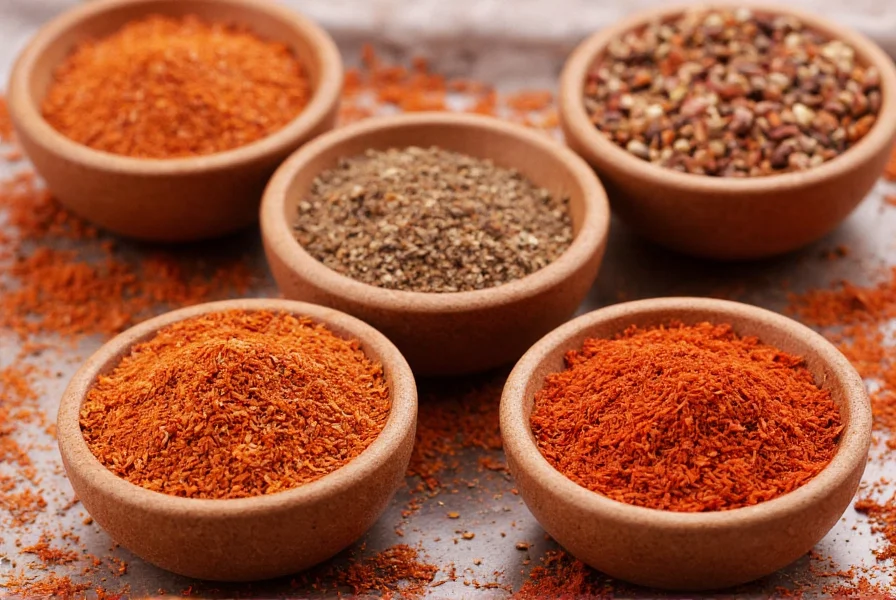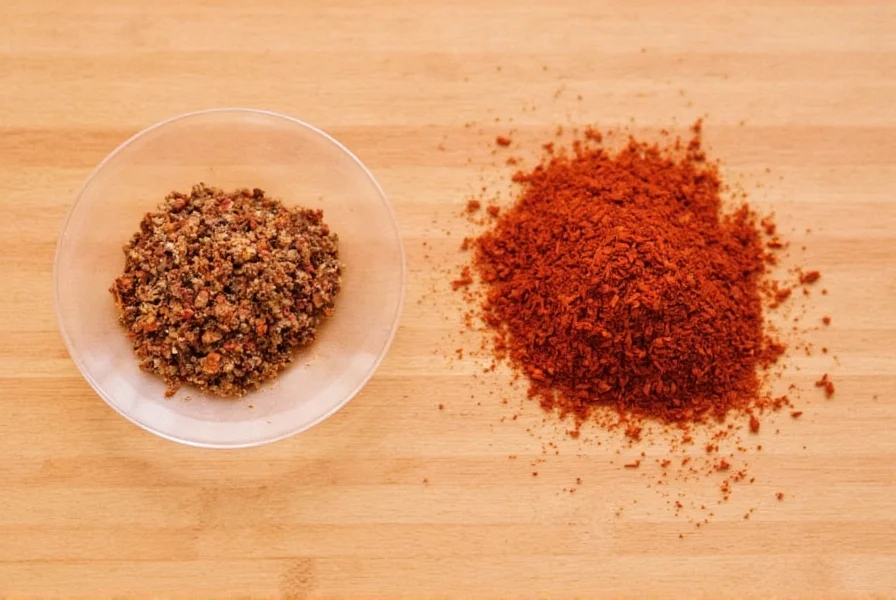When you're in the middle of cooking and realize you've run out of red pepper flakes, knowing reliable alternatives can save your dish. Red pepper flakes provide both heat and subtle fruitiness to recipes, making them essential in Italian, Mediterranean, and many global cuisines. Understanding what makes them unique helps you select the most appropriate substitute without compromising your culinary creation.
Understanding Red Pepper Flakes Characteristics
Red pepper flakes typically consist of crushed dried cayenne peppers, though some blends include other chili varieties. They deliver moderate heat (30,000-50,000 Scoville units) with a slightly smoky, fruity flavor. Unlike pure cayenne powder, red pepper flakes contain seeds and membrane fragments that contribute to their complex flavor profile and visible texture in dishes.

Top 5 Substitutes for Red Pepper Flakes
Choosing the right alternative depends on whether your recipe needs primarily heat, flavor complexity, or visual texture. Here's how the most common substitutes compare:
| Substitute | Heat Level | Flavor Profile | Conversion Ratio | Best For |
|---|---|---|---|---|
| Cayenne pepper | Hotter (2x) | Pure heat, less complexity | 1/2 tsp cayenne = 1 tsp flakes | Sauces, marinades, baking |
| Aleppo pepper | Milder (1/2) | Fruity, moderate heat, slight saltiness | 1:1 replacement | Pizza, pasta, roasted vegetables |
| Paprika + cayenne | Adjustable | Smoky base with added heat | 1 tsp paprika + 1/8 tsp cayenne = 1 tsp flakes | Tomato-based sauces, stews |
| Crushed Calabrian chilis | Similar | Fermented, complex, oily | 1:1 replacement | Italian dishes, finishing oil |
| Black pepper + pinch cayenne | Much milder | Pungent with subtle heat | 1/2 tsp black pepper + pinch cayenne = 1 tsp flakes | Cream sauces, delicate dishes |
How to Choose the Right Substitute for Your Recipe
Consider these factors when selecting a red pepper flakes alternative to maintain your dish's intended flavor profile:
For Italian Cooking and Pizza
When substituting red pepper flakes for pizza or pasta dishes, Aleppo pepper provides the closest flavor match with its moderate heat and subtle fruitiness. If you need more heat control, use sweet paprika blended with a small amount of cayenne pepper. For authentic Neapolitan pizza, Calabrian chili paste offers similar fermented complexity, though it adds moisture to your recipe.
For Marinara and Tomato-Based Sauces
The acidity in tomato sauces interacts differently with various chili compounds. For red pepper flakes replacement in marinara sauce, a combination of smoked paprika and cayenne works best, as the smokiness complements tomatoes while providing adjustable heat. Start with 3/4 teaspoon smoked paprika and 1/8 teaspoon cayenne per teaspoon of red pepper flakes called for, then adjust to taste.

Mild Substitute Options
If you need a red pepper flakes alternative for mild heat, particularly for children's meals or sensitive palates, try black pepper with a tiny pinch of cayenne or use white pepper for a different kind of warmth without visible specks. For a completely mild option that maintains visual similarity, crushed dried bell peppers provide the texture without heat.
Measurement Conversion Guide
Precise measurements matter when substituting for red pepper flakes, as heat levels vary significantly between alternatives. Always start with less than you think you need, then adjust after cooking:
- For every 1 teaspoon red pepper flakes:
- Use 1/2 teaspoon cayenne pepper (very hot)
- Use 1 teaspoon Aleppo pepper (milder)
- Use 3/4 teaspoon paprika + 1/8 teaspoon cayenne
- Use 1 teaspoon crushed Calabrian chilis
- Use 1/2 teaspoon black pepper + tiny pinch cayenne (mild)
- When substituting in baking recipes, reduce quantities by 25% as heat intensifies during cooking
- For soups and stews, add substitute gradually during last 10 minutes of cooking
Common Substitution Mistakes to Avoid
Many home cooks make these errors when looking for what to use instead of red pepper flakes:
- Using equal amounts of pure cayenne - This creates excessive heat as cayenne is significantly hotter than red pepper flakes
- Adding substitutes too early in cooking - Many chili compounds break down with prolonged heat; add near the end for maximum flavor impact
- Ignoring recipe moisture content - Liquid substitutes like hot sauce require reducing other liquids in the recipe
- Not tasting as you go - Heat perception varies between people; always adjust to your personal preference
Creating Your Own Custom Blend
For the most accurate red pepper flakes replacement, create a custom blend using available ingredients. Combine 2 parts sweet paprika, 1 part cayenne pepper, and 1 part dried oregano for an Italian-inspired substitute. For a smokier profile, replace half the paprika with smoked paprika. Store your custom blend in an airtight container for up to 6 months.
When Substitutes Won't Work
Some recipes absolutely require authentic red pepper flakes for proper texture and flavor release. This includes traditional Italian dishes like arrabbiata sauce, where the flakes' gradual heat infusion during cooking creates the signature flavor profile. In these cases, consider making a quick trip to the store rather than substituting, as the unique characteristics of red pepper flakes significantly impact the final dish.











 浙公网安备
33010002000092号
浙公网安备
33010002000092号 浙B2-20120091-4
浙B2-20120091-4